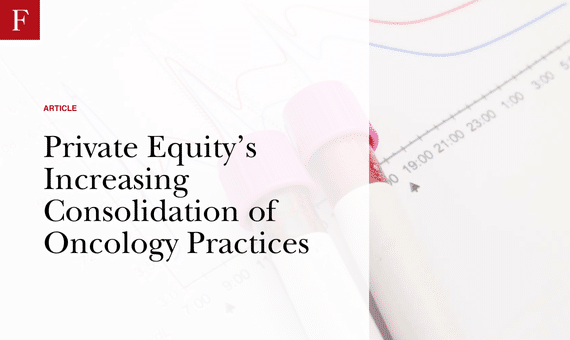
Private Equity’s Increasing Consolidation of Oncology Practices
On April 23 a group led by private equity firm TPG agreed to acquire OneOncology, the nation’s largest independent community oncology network, in a deal valued at $2.1 billion. AmerisourceBergen, the big drug wholesaler, is buying a minority stake in the firm; OneOncology’s affiliated practices, physicians, and management team will also retain a minority interest.
“We believe that lower cost, higher quality models represent the future of care delivery,” TPG Partner John Schilling said in the press release announcing the deal. OBR, a digital media outlet focused exclusively on oncology, said the deal “highlights the potential for private equity ventures to support and help community oncology care grow across the U.S.”
While the biggest recent deal, OneOncology is hardly the first oncology platform to be sold to a private equity group. The company itself was formed in 2018 by another PE firm, General Atlantic, which is selling out of its position in the new deal.
Over the past 20 years, PE firms have “poured money” into 724 oncology practices, or about 10% of the nearly 7,000 clinic locations in the U.S., according to a recent report by researchers from the Harvard Medical School and the Harvard Business School that was published in JAMA Internal Medicine.
“There has been a marked increase in PE acquisition and consolidation of oncology practices over the past two decades,” said Dr. Michael Milligan, a radiation oncology resident physician who led the study. “Similarly, PE-backed platform companies have undergone substantial consolidation through mergers and acquisitions.” There are now 23 PE-backed platform companies, Milligan said.
Yet, if anything, PE involvement in “low-competition environments such as outpatient oncology” has trailed that in other medical fields, such as dermatology and gastroenterology, which have become “crowded” with PE investors, said Krishna Patel, a consultant at Sojus LLC, which provides strategic marketing content for biopharmaceutical companies. But oncology “also promises lucrative gains,” she said.
Market drivers
So what’s driving this relatively recent PE interest in oncology, and why would an oncology practice want to partner with a PE group?
As we’ve seen in other healthcare verticals, PE interest is driven by the opportunity to provide growth capital, contribute management expertise, and consolidate a fragmented industry to increase efficiency. But oncology has its own unique drivers.
For example, PE provides oncologists with alternatives to working for hospitals, which are buying up and consolidating oncology practices in their own right.
Gordon Kuntz, a consulting partner at Kuntz Consulting, which focuses on cancer care, told OBR that “many doctors currently working in hospitals would rather not be” and that PE provides the “type of capital support that could help slow or reverse the trend of hospitals consolidating practices by providing the significant money needed up front to start and operate” their own independent platforms.
“With all the changing insurance relationships and the cost of doing business on a day-to-day basis, that’s a pretty risky proposition,” he said. “But if you’ve got a [PE] backer … then it’s somebody else’s financial risk. You get to do what you wanted to do in the first place, and you don’t have to work for a hospital system.”
Dr. Jeff Patton, OneOncology’s CEO and a board member, said he helped launch OneOncology to help community practices compete with hospitals.
Likewise, as the changing healthcare ecosystem continues to shift toward outpatient, price-transparent payment models, PE groups can help oncology groups prepare for value-based care (VBC), in which providers are paid based on the health outcomes of their patients and the quality of services rendered. In addition to negotiated payments, providers can earn incentives for providing high-quality, efficient care. According to Patel, the current “fragmented nature of oncology care has resulted in a lack of data transparency in many cases, hindering participation in these value-based models.”
PE partners can also help oncology groups become one-stop shops for various services, such as in-house lab testing, specialty pharmacy, infusion, imaging and radiation.
“A big part of oncology is buying and billing chemotherapy, and we’re able to improve their economics there substantially with national buying power,” Patton told OBR.
In addition to OneOncology, other major oncology platforms include the following:
- Genesis Care. This Australian oncology platform, backed by PE giant KKR, acquired 21st Century Oncology in May 2020 in a deal valued at over $1 billion. The combined entity includes over 5,000 physicians at 440 locations around the world.
- Alliance Health Services. Formerly owned by Tahoe Investment Group, which bought the company in April 2017, Alliance was acquired by Akumin, a publicly traded company, in June 2021 for $820 million. Tahoe still owns a minority interest.
- US Oncology Network. Supported by McKesson, the big medical supplies and equipment company, the company boasts more than 1,400 physicians in its network, operates more than 500 cancer treatment centers in the U.S. and treats more than 1.4 million patients a year.
- The Oncology Institute (TOI). Founded in 2007, publicly-traded TOI provides care to about 1.8 million patients in more than 60 clinics.
- American Oncology Network. In April AEA Growth paid $65 million to acquire a minority interest in AON to help further the company’s goals of supporting community practices and improving the patient experience. AON will continue to be majority owned and governed by licensed oncologists. AON’s platform includes almost 200 providers including over 100 physicians and 30 practices across 77 locations in 17 states.
This article was previously published on JD Supra.














